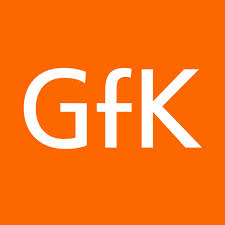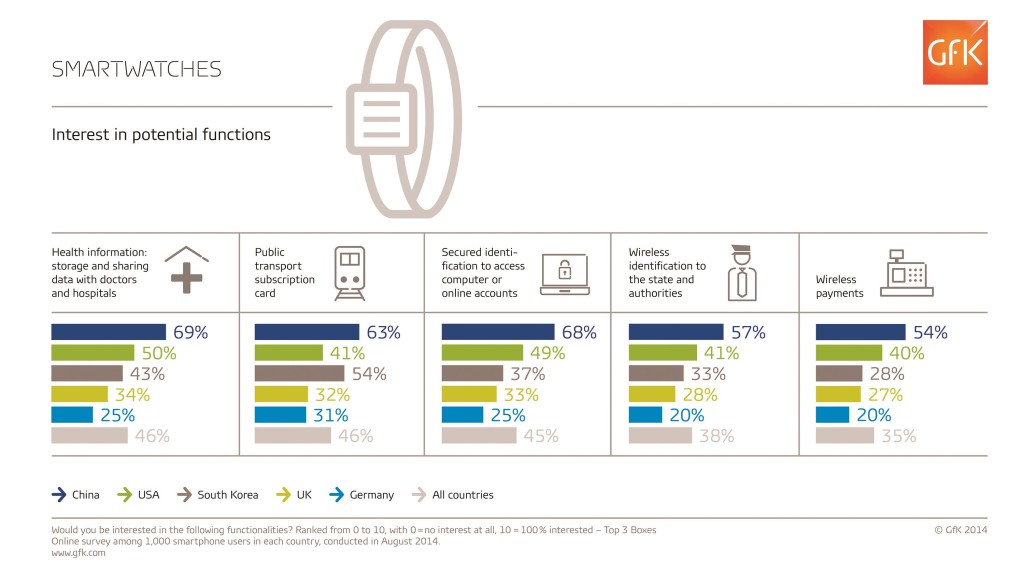 Nuremberg, 13 October 2014 – A recent GfK survey in China, Germany, South Korea, the UK and the US indicates that people in these countries see potential in using smartwatches to ‘carry’ tickets for passenger transport or as security keys to their computers and online accounts. The ability to transmit healthcare data via a smartwatch is also of particular interest to the majority of people. In America and China, there is openness for using smartwatches as identity cards and payment systems, although Europeans are much more hesitant about these functions.
Nuremberg, 13 October 2014 – A recent GfK survey in China, Germany, South Korea, the UK and the US indicates that people in these countries see potential in using smartwatches to ‘carry’ tickets for passenger transport or as security keys to their computers and online accounts. The ability to transmit healthcare data via a smartwatch is also of particular interest to the majority of people. In America and China, there is openness for using smartwatches as identity cards and payment systems, although Europeans are much more hesitant about these functions.
These are findings from an international study in which GfK asked 1,000 smartphone owners in each market if they would be interested in being able to carry out specific functions via a smartwatch, assuming they could save and send their data securely.
The survey reveals that smartwatches have the potential for a wide range of uses. Gathering sports activities, navigation, phone calls and apps are the main applications that surveyed consumers are interested in at present. Due to the nature of a smartwatch being worn on the wrist, it could also serve as proof of identity, a travel ticket holder or a method of making payments at the checkout.
Smartwatches could carry healthcare data
Nearly half of everyone surveyed across the five countries say they would be interested in using a smartwatch to provide doctors or hospitals with their personal healthcare data – for example, during a doctor’s appointment or in a medical emergency situation. However, people in different countries differ widely in how far they are ready to entrust sensitive health information to a smartwatch; 69 percent of those surveyed in China said they are interested in this compared with just 50 percent in the US and 43 percent in South Korea. European consumers are more hesitant, with around one third of respondents in the UK expressing an interest and just one quarter in Germany. Men are rather more open to this idea than women and the difference between age groups is even more marked, with interest in using a smartwatch for their health data increasing with age.
Asians and Americans see potential for smartwatches as travel tickets
GfK’s findings also show that smartwatches have clear potential as travel tickets. Just less than half those surveyed across all five countries say they would be happy to use a smartwatch for this purpose. The Chinese (63 percent), Koreans (54 percent) and US citizens (41 percent) were the most interested. European consumers were again more reticent with only 32 percent of respondents in the UK and 31 percent in Germany saying they would use a smartwatch as a travel ticket.
Older generations open to using smartwatches for online identification
Faced with rising cybercrime levels, there is a general desire for ways to improve security and this is reflected in GfK’s findings. Overall, 45 percent of respondents say they would be interested in using a smartwatch as secure identification to log on to personal computers or access online accounts. Interest in this function increases with age, starting at 42 percent of those aged 16-29, and rising to 46 percent of 30-49 year-olds and 48 percent of the over-50s. On a country by country basis, China shows most interest in this function, with over two thirds (68 percent) saying they would be happy to use a smartwatch as secure identification on their computers. They are followed by the US with just under a half (49 percent), South Korea with 37 percent and the UK with 33 percent. Germany again shows more hesitation, with just one quarter of all Germans surveyed saying they would be happy to use a smartwatch as secure identification on their computers.
Chinese happy to use smartwatches as identity cards
Across all five countries, 38 percent of those asked say they would be interested in using a smartwatch as an ID card when going abroad or visiting the authorities. Once again, China and the US are out in front in being open to this idea, with 57 and 41 percent respectively, followed by South Korea and the UK, with 33 and 28 percent. The Germans are again the most critical; just one fifth say would use a smartwatch as an ID card.
Paying by smartwatch? Only the US and China are interested to date
Mobile payment, i.e. using a smartphone to pay at the checkout with near field communication (NFC) technology, hasn’t proved very popular so far. In theory, using a smartwatch at the checkout would be even more convenient than getting out a smartphone; but only 35 percent of respondents across the five countries surveyed are interested in this facility at present. The real potential for this is in China, where interest increases to 54 percent of those surveyed, compared with 40 percent in the US and only 28 percent in South Korea and 27 percent in the UK. In Germany, just 20 percent of those asked say they would use a smartwatch to make payments.

About this study
The data was collected in a study of smartphone owners in China, Germany, South Korea, the UK and the US which was conducted in August 2014. In each country, 1,000 respondents were surveyed online.
The complete study “Wearables: geek chic or the latest “must have” consumer tech?” can be downloaded here: http://www.gfk.com/Industries/technology/Pages/Wearables.aspx
Planned GfK baseline survey on smartwatches
GfK is planning to conduct a broad baseline survey which will help smartwatch providers to develop successful business strategies. The research will be carried out on the basis of a multi-client approach in which any interested companies can participate. This will ensure maximum efficiency and economic benefits. The survey insights will support the optimization of resources, for example in product development and communications, in this way significantly increasing the return on investment.
About GfK
GfK is the trusted source of relevant market and consumer information that enables its clients to make smarter decisions. More than 13,000 market research experts combine their passion with GfK’s long-standing data science experience. This allows GfK to deliver vital global insights matched with local market intelligence from more than 100 countries. By using innovative technologies and data sciences, GfK turns big data into smart data, enabling its clients to improve their competitive edge and enrich consumers’ experiences and choices. For more information, please visit www.gfk.com or follow GfK on Twitter: https://twitter.com/GfK_en
